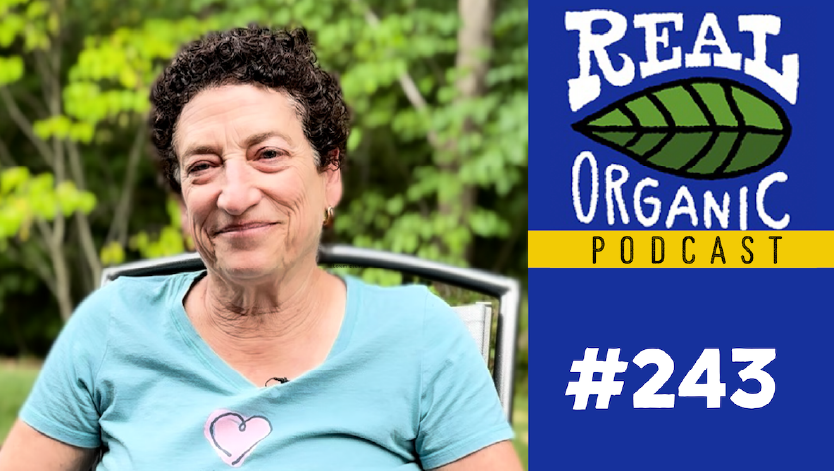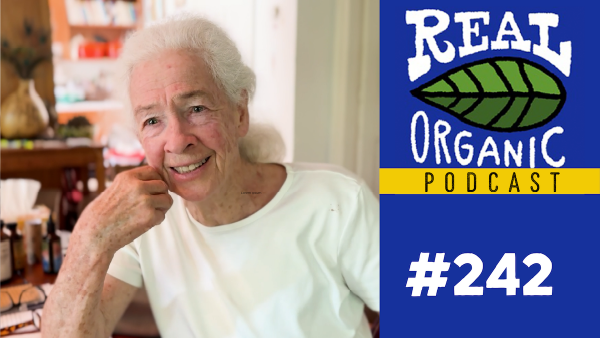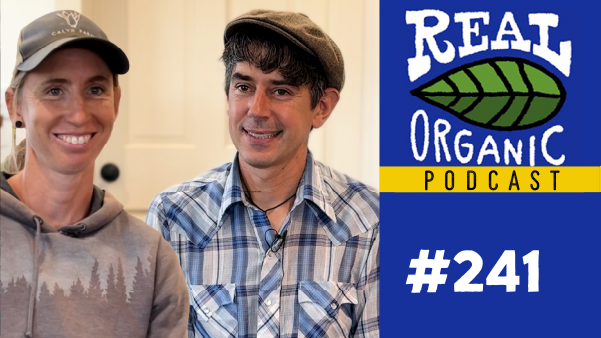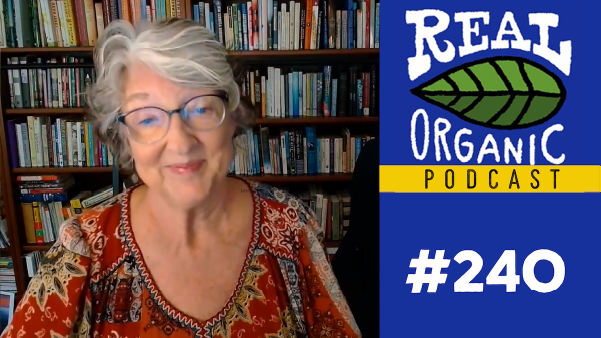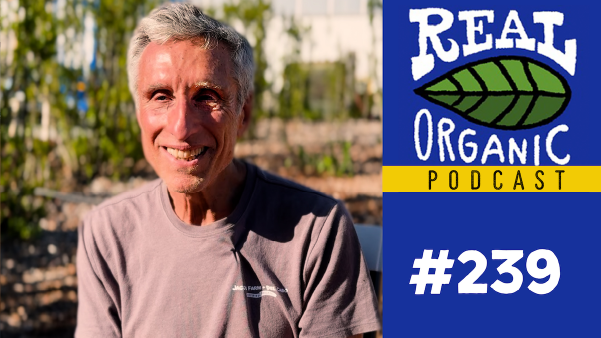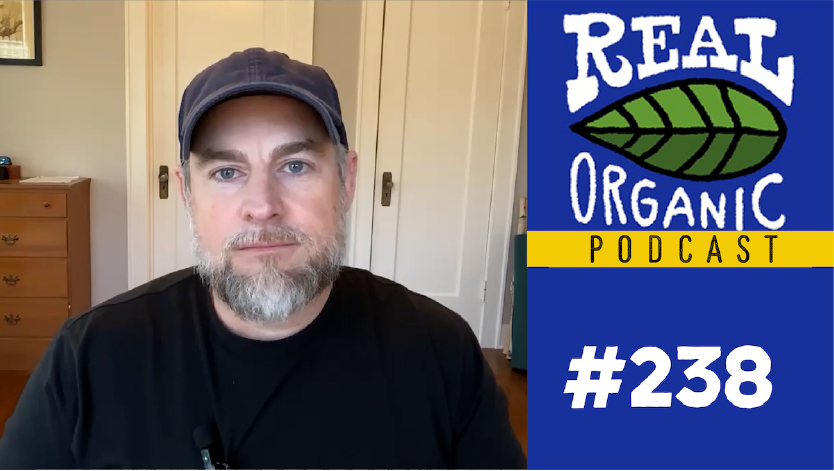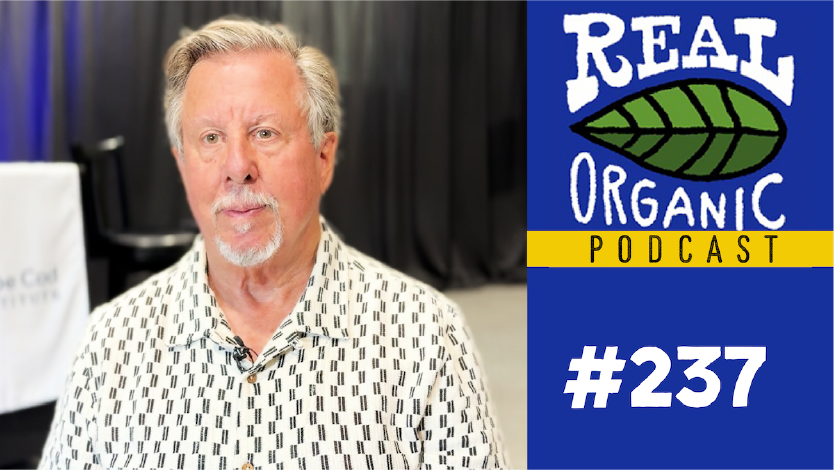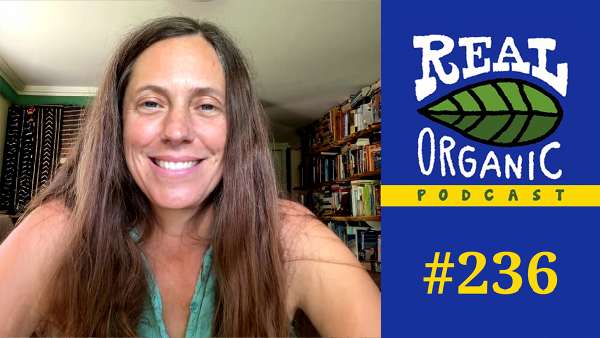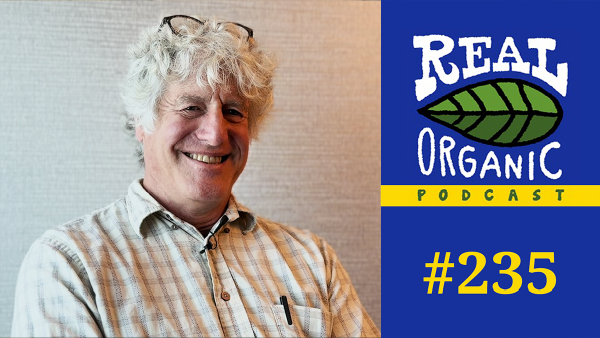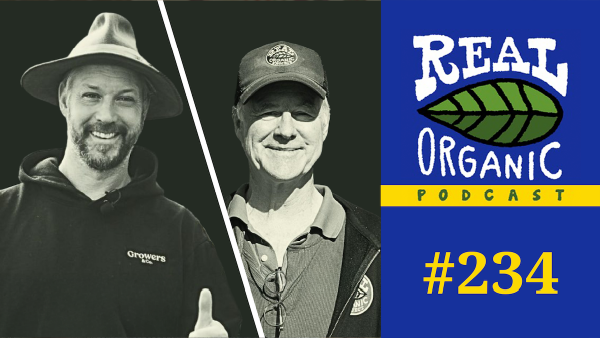Episode #208
Warren Weber: Youthful Optimism And Embracing The Unknown
Welcome! You can subscribe and download episodes of our show through your favorite podcast app.
You can also subscribe to receive the video version of each episode on our YouTube channel.
Our Warren Weber interview has been edited and condensed for clarity:
Dave Chapman interviews Warren Weber in California, Winter 2022:
Warren Weber 0:00
The motivation of organics in the first place which really was around the consumer. It was our consumers, who created the industry more than the farmers did. We were responding to what they wanted. A lot of the history is about all these organic farmers are so smart, and they came together, they did this thing, but it was always, at least here, it was always about our consumers.
Warren Weber 0:35
When I started out, we had all these little natural food stores around here, our store…and we were just supplying them, and we were trying to do what they wanted us to do, and we ended up getting the laws because people wanted those laws. We didn’t feel we needed them so much as they feel we needed them.
Linley Dixon 1:01
Welcome to the Real Organic Podcast. I’m Linley Dixon, co-director of the Real Organic Project. We’re a grassroots farmer-led movement with an add on organic food label to distinguish organic crops grown in healthy soils and organic livestock raised on well-managed pasture. All without synthetic fertilizers and toxic chemicals. You just heard from Warren Weber, who’s legendary, Star Route Farms, was the oldest continuously certified organic farm in California before it was sold to the University of San Francisco in 2017.
Linley Dixon 1:31
Warren and Dave had a conversation way back in 2022, some of it philosophical, some of it sentimental, and some of it challenging. We hope you’ll enjoy it. There are a few updates to the answers Dave gives Warren here about Real Organic Project in the two years since this interview happened. About its structure, our current executive board is made up of 11 members now, eight of whom are farmers, and our current advisory board is still composed of a group of 50 thought leaders in the organic movement, including journalists, chefs, scientists and professors. Our standards, which are crafted by some of the best farmers we know, are always evolving, and today, we have a 13% rejection rate from our certification program, which reflects our commitment to rigor and integrity.
Dave Chapman 2:27
I’m very pleased today to be talking with one of the true pioneers of the organic movement in America, Warren Weber. Warren, you were amongst the very first practitioners in America. I imagine, I don’t know, Paul Keenan and [inaudible 02:47] must have been a little before you?
Warren Weber 2:49
Well, yes. There was a lot of people practicing what we now call ‘organic agriculture,’ kind of, basically nature-based farming at the time. We got certified in ’74. We were looking at it from…you might call a business point of view. We were looking at how we can succeed doing what we think we ought to do and bringing everyone else along.
Warren Weber 3:22
IFOAM, International Federation of Organic Agriculture Movement, came here for their meeting, and I don’t know it was the late 70s to San Francisco. They made the round of farms and they ended up at Star Route as the last. I said, “What are your impressions of California?” These are farmers from Australia and Europe and Africa. To a person, they said, “Well, this is very different than what we’re used to. Very different what you all are doing here.” They said, “What you’re doing here is so…it seems so entrepreneurial. So business like.”
Warren Weber 4:15
And it was. It was. We were all long hairs in the beginning, but what happened we kind of shaved off the ones that didn’t want to make a success of this thing. Who didn’t want to supply people with organic produce. Who were in it for their own kind of lifestyle reasons, and not so much for the overall culture.
Warren Weber 4:43
The organic industry here was driven by consumers. We did the standards. We created the first standards is 1979 with the state. Because the consumers said, “We need to know what we’re getting when we’re going into all these wonderful natural food stores we have on here. We need to know what that is, and we need real assurance.” So, we thought, “Okay. Then we need something bigger than our own organization. We have to reach out.” So, we ended up doing with the State of California, initially, the Health Department, first standards.
Dave Chapman 5:27
Okay. Warren, that’s very interesting what you said that you were entrepreneurial. You were making it a business. Like all farmers who make a living, I’m entrepreneurial too, and it’s a business for me too. We all know that if this is going to thrive and survive, it needs to somehow sustain the people involved in it; the farmers, the distributors, the retailers.
Dave 5:54
But, we’ve been struggling with so much compromise in the National Organic Program, and I would say it’s gone beyond compromise to dissolution. I had a conversation with a guy who was a nice man. He was a director of CCOF on the board, and another mutual friend set it up. We had conversations about the certification of hydroponics. It was sort of like he’d never thought about it. We had a nice conversation, and at the end, he said, “I kind of envy you, because it sounds like in the northeast organic is still a movement, and out here it’s really just become a business.”
Warren Weber 6:41
I see, yeah. That’s interesting.
Dave Chapman 6:45
I thought, “I want it to be a business, but it’s got to be standing on the shoulders of a movement. Is how I feel about it, or else, any compromise is acceptable, because it’s just a business.”
Warren Weber 6:58
Well, that’s very true, of course. The loss of the notion of the soil-based aspect, which is so fundamental to what we believed in, what is organic really needs to mean, always mean, that has been really unfortunate. I think people take it over. Well, the younger farmers back then, in the 70s, 80s, organic farmers who created it, we did it so successfully that it was taken away from us. In the 90s, I had to shut down. We shut down for a while because the guys got in.
Dave Chapman 7:50
How did that show up in your farm? Why did you have to shut down?
Warren Weber 7:55
What happened was that we were doing a lot of mesclun mixes. You call it spring mix now mostly, but mesclun mixes, which is now huge. But we were doing that and I moved down to open up winter production down in Coachella Valley in 1987. We were growing down there and we were shipping from there in the wintertime back east, in different places. Semis would come in and pick up. We were small farm. I think we were doing maybe 60 acres there for a while and we did 100, but they would pick up partial loads, and then go to Boston, or wherever.
Warren Weber 8:54
A lot of this was mesclun mix and various salad greens. We did 60 different types of greens. We were selling mesclun mixes at, I think, $11 a box. Three-pound box. Our breakeven was nine. We were doing pretty well. All of a sudden, I was told, “Well, you’re going to have to lower your price.” I said, “Well, how much? “Five dollars. We pay you five dollars, and if you can’t fill the semi, we can’t come in.” I couldn’t do either those things. So, we just stopped. Within about 10 days, I got a call. It was really dramatic and really difficult. I actually hung on for a while, as long as I could, and kind of lost a few hundred thousands dollars and then I just had to quit altogether.
Warren Weber 10:13
When I did, I got a call from Grimmway Farms, which was just a conventional carrot grower doing 40% of all the carrots in the nation, asking if I wanted to rent this ground to them. I said, “Okay.” They had decided, months previous, that they saw this industry growing. Into the 80s, it was growing like 20% a year. It was doubling every four years or something. It was small, but it was fast.
Dave Chapman 10:57
It wasn’t growing because your marketing was so good, it was growing because people wanted it.
Warren Weber 11:01
Because people wanted it, and the stores were evolving, and natural food business was changing, growing very fast.
Dave Chapman 11:11
Warren, you brought up two really interesting points. One is that there is a place for big industrial Ag, and that they might even do it right. They might…
Warren Weber 11:29
You mean industrial organic Ag?
Dave Chapman 11:31
Industrial organic Ag. That they might grow food that’s nutritionally equivalent to what the small farmer will do.
Warren Weber 11:43
Well, that’s a separate question altogether – nutrition, analyzing the plant. I remember being told, I believe it’s actually correct, that if you harvest broccoli and you get it to the freezer, cold storage and freeze it within two hours, it has more nutritional value than the broccoli that’s traveled another three days in the market. That’s scary, but that’s nutrition. That’s a separate subject. Then the practices that we demanded for organic certification, the bigger farms can do it. It’s was very interesting to watch Grimmway when they leased our 60 acres in the beginning, then they only needed that for a few years. But it was very interesting to watch, because they were doing everything that we did before.
Dave Chapman 13:11
They’re growing cover crops…
Warren Weber 13:13
They were composting, they were companion planting. They could do larger blocks than we were doing, but you could end up going 20 acres of carrots or beets or whatever, organically. And wasn’t really a problem. You could do it successfully.
Dave Chapman 13:36
They were taking care of their workers the same way you did?
Warren Weber 13:38
Well, I don’t know about that, but that was not one of the standards, and there was no real good definition for that. Although I can tell you plenty of small organic farmers were not paying workers comp. We had this organic scene going on and everyone’s doing the right thing. Anyway, having watched Grimmway, I was impressed by their practices, but it was also scary to see that they could just sort of take it over.
Dave Chapman 14:30
Okay. Was it just scary personally because you saw your business dissolving, or was it scary as a citizen because you went, “This isn’t really the world I dream of.”?
Warren Weber 14:43
Well, it was very scary personally. I went through a real depression. We had to stop doing what we’re doing, and I started another direction of having a cold storage over in San Rafael, and I was putting together boxes of other people’s stuff. Because we had this year-round production, which was really excellent in…being able to produce all the year, and pretty much the same mix of crops turned out to be very, very helpful to cash flow and getting ready to buy seeds for the next planting [inaudible 15:30]. Yeah, it was a personal blow to me. It took me a while to accept the fact that we’re living in a capitalist system and these are the things that happen.
Dave Chapman 15:51
Yeah, but there’s a lot of kinds of capitalism.
Warren Weber 15:56
I honestly have never been sure if it was a bad aspect or a good aspect. I think it’s just there’s so many different ways of looking at these things. It certainly provided a lot more organic produce to a lot more people than we were doing, than all of our thousand little farms were doing. When the big guys got in, they broaden the market, and Whole Foods grew. All these stores grew, and it just became a lot, lot bigger. A lot of people in places around the country who didn’t know what organic was started to find it on their shelves. In Costco, for God’s sakes.
Dave Chapman 16:40
Yes. Walmart is the biggest vendor of organic produce in the world,
Warren Weber 16:44
Yeah. I want to say, another thing that occurred to me at the time was that I realized, “Well, these guys cannot afford not to do it.” These practices are religious, in a strict sense. I don’t want to use the word ‘religious,’ but in a strict sense, because they have more to lose. They have a huge thing to lose with a scandal. They’re in all these stores now. They built up this business. It’s still a small part of their overall business, but if they want to stay in it, they can’t afford some scandal. Somebody calls up and say, “Hey, I know they’re using chemical fertilizers out there.” Whereas the smaller growers, and I know this from my personal involvement over the years, the smaller growers, a lot of times we’re faced with made bad choices, not organic choices.
Dave Chapman 17:53
That’s true. The big ones too. Look at Aurora.
Warren Weber 17:59
I’m sure. That’s why I’m a fervent backer of organic eye. We need this. We need this oversight. We need this watchdog oversight. It should be even larger and more effective and everything than it is.
Dave Chapman 18:26
The fraud exists, and it exists on many scales. What we’re seeing now without a doubt is that these corporations are so big and powerful that they can change the rules. It’s not broad anymore. The Billion Dollar organic egg industry is legal. If the animal welfare reform had been passed, according to the head of the National Organic Program, 70% of the organic eggs in America would have been decertified. He was intending to pass it, but he couldn’t, because the politicians stopped it, because it was too big to fail.
Warren Weber 19:07
Okay, so I have a question for you. What is the long-term strategy of Real Organic? Is it just to have a certification on top of the organic standards, or is it to start something else? And if you did that, you would probably do it outside of the government, and would you consider…” I’m just throwing this out. The underwriter lab idea that we came up with back in ’79 when we talked about what organic means, how we’re going to protect the notion of it, the label of it. A couple people said we should create a fund for ourselves, defend ourselves in court, create an underwriter lab kind of an organization and protect our label in court. Other people said, “No. We want the government to do it.” We went the ladder out. Here’s Real Organic, I think, maybe at that stage.
Dave Chapman 20:25
Yes. My hope would be that the Real Organic label and the movement that supports it would become strong enough that it would become the choice for people who are seeking that kind of food. I think there are millions and millions of people seeking that kind of food. I think they’re often being misled. They don’t know that what they’re getting is hydroponic berries, they don’t know that what they’re getting is CAFO milk and eggs. I think if there was an alternative that they could rely on, they would move to it.
Warren Weber 21:06
So, my question about that is, what’s the structure of it? What’s the structure of this label?
Dave Chapman 21:18
How are decisions made, you mean?
Warren Weber 21:21
No. Is it a association of members? Is it a nonprofit corporation? How does it fund itself? What are its rules? How does it protect its own rules? Who’s involved, who gets in, who doesn’t get in? What are the criteria? What’s the whole list of things? All these standards.
Dave Chapman 21:58
I’ll tell you all that. We have about 50 board members. The largest group are the Advisory Board. We’ve got 15 members on a Standards Board, and they are voted in by all the boards. We’ve got a five-person Executive Board. The Executive Board is doing the heavy lifting. The Standards Board sets the standards. It’s like the NOSB, the National Organic Standards Board, except instead of being chosen by Tom Vilsack, it’s chosen by these 50 people. You would know and respect virtually all of those 50 people. They are mostly farmers, but not all. We’ve got some scientists and we’ve got some journalists and we’ve got some educators, but the majority of farmers, the Executive Board, four out of five are farmers.
Dave Chapman 22:54
Unlike the NOSB, when they decide something, it’s not just a recommendation, it is the new standard, unless the Executive Board deems it illegal or suicidal. Pretty much every recommendation they’ve ever made has been immediately adopted. That’s how standards are set. As I say, instead of one person selecting them, there’s 50.
Warren Weber 23:20
So, you have the standards, and then you have a certification process for those standards?
Dave Chapman 23:31
We do. We have a team of about 10 people who review the written applications. If they pass the written then they inspect the farm. The inspections are only once every five years, but you must be certified by USDA annually. That kind of heavy lifting of reviewing all the materials is already done. It might not be done perfectly, that’s the USDA challenge, but we’re accepting that most of certification is pretty reasonable and is pretty well done. The part that’s not well done is that they’re knowingly certifying hydroponics. They’re knowingly certifying CAFOs. They’re knowingly looking the other way on grain fraud.
Dave Chapman 24:18
Those are the three big areas. That we’re looking for soil-based, we have a grid of soil practices to ensure that they are attending to building and maintaining the fertility of the soil. We have fairly strict animal welfare standards that they must have access. We require more higher percentage of pasture than the USDA does. The chickens have to actually go outside, not just have a little hole in the wall that they would be crazy to go out of.
Warren Weber 24:54
I think that sounds really good to get away from the bad practices.
Dave Chapman 25:01
I’ll say one more thing. It’s free to the farmers.
Warren Weber 25:04
It’s what?
Dave Chapman 25:04
Free to the farmers. We entirely survive off donations. Now, I don’t know if that will last forever, but we’re trying very hard to have that be basis. I prefer the Danish model to the US model. In Denmark, the government pays for certification, a hundred percent. I think that’s a sane way to do it. I’m not opposed to government involvement; I’m opposed to government corruption.
Linley Dixon 25:36
In Denmark, then they’re paying for the certification, but then they’re also doing the certifications. The government is certifying not private groups.
Dave Chapman 25:49
I think they have private groups who are certifiers as in the US. The government approves them, but the government pays the bill. Government also offers tremendous amount of technical support and marketing support to the organic movement, because they see it as a social benefit for the whole country. Even if you choose not to buy organic, they think, “Yeah, but your water is cleaner, the whole system is healthier.”
Warren Weber 26:20
I think the only thing I hear in there, that I would suggest is that you visit your farms more frequently than once every five years.
Dave Chapman 26:30
I would love to, Warren. We just need more money.
Warren Weber 26:32
Because a lot of things happen and even the once a year visits.
Dave Chapman 26:41
I know. We just need to have more donations pouring in to do that.
Warren Weber 26:48
Yeah. Well, then there’s nothing wrong with paying for what you get.
Dave Chapman 26:56
There isn’t. But you know as well as I do that the farmers are already carrying a huge burden. We have 1100 farms that have been certified now. Honestly, for all but a handful of them, there’s been no economic reward. They simply believe in what we’re doing. If we succeed, there will be a financial reward. They will be able to get on a shelf because of their label, or people will pay a small premium because of their label, but it’s not there yet. So, all these farmers are doing this because they don’t like what’s happened to the National Organic Program, they do believe in organic.
Warren Weber 27:45
How is this going to change the NOSB?
Dave Chapman 27:51
At the moment, the NOSB is unable to accomplish anything. The recommendations haven’t been acted on for 10 years.
Warren Weber 28:02
Presumably, this is going to get worse and worse, and so at some point Real Organic will have to say, “Well, you don’t have to do the NOSB thing, because there’s no respect there.” Which means that if they sort of start certifying these factory farms, they start certifying these farms in six-story buildings, in New York City and all around in Los Angeles, and they have the hydroponics, and they have…everything. All the animal husbandry is just total terrible. You’re going to have to say, “Well, what’s the point of having any inspection from them?” Which means you’re going to have to inspect.
Dave Chapman 28:59
At that point, we’ll have to charge for it, unless we can find a large enough funder to support that.
Warren Weber 29:11
That’ll be a good place. That’ll be a very good place to be.
Dave Chapman 29:14
We’ll also need a large Legal Defense Fund, because we’ll gets sued by the USDA.
Warren Weber 29:21
Yeah. Of course, most of the produce in the stores, organic will be the USDA guys. Well, but maybe that will matter. Maybe we’ll just have one of the small sects in a bigger religion.
Dave Chapman 29:54
We see that everything in the world is becoming…well, you know it’s interesting. I was going to say, ‘more fragmented,’ and that less mass movement in much smaller chunks. But at the same time, there’s a thing going on, and it’s going on most particularly in the food movement, where we have fewer and fewer retailers. I sold to three companies in the northeast that are all now owned by one Dutch multinational. Major chains. There’s a fourth one, I just never sold to them. All owned by one Dutch multinational. We see that there’s this consolidation. Just like Grimmway is now owned by Taylor is now owned by I don’t even know which investor…
Warren Weber 30:43
Whole Foods owned by Amazon.
Dave Chapman 30:45
Whole Foods owned by Amazon. We see this happening, and every time that happens, I can tell you that when our Whole by Stop & Shop…Stop & Shop choices start to look more like Walmart. That we lose diversity of choice.
Warren Weber 31:08
Way back, farmers, they bring stuff into a store, they’d be at the farmers market, and you’d ask them, “Well, are you organic?” They say, “Oh, yeah. I’m organic. I don’t use pesticides” or, “Yeah, I’m organic. Trust me.” That was where it was the beginning. People did. They did trust them. Because the consumers wanted more of it, they needed these standards, so then we get these standards.
Warren Weber 31:49
Now the consumers have a lot of it, and they have those standards which we don’t like, for much of it, but nevertheless, they have a lot of it, so what’s really happening on the tail end then, on the real organic end of these thousand farmers? What’s happening, which seemed to me, would be that, we’re kind of going back to, “Well, we’re going to redefine what we mean by this, but if you don’t really have it certified and in a strict way, in a real conscionable way, with real oversight, then you’re kind of everybody, ‘Oh yeah. We’re are organic.'” “Oh, okay. Yeah, I’m organic. I’m, like, Real Organic.” I don’t know. Maybe that’s okay.
Dave Chapman 32:51
There’s no way that a real regenerative farmer can stop Bayer Monsanto from saying they’re regenerative. I’ll tell you what? Bayer Monsanto has got a much bigger microphone than that livestock farmer.
Warren Weber 33:07
What’s it going to mean for anybody to say anything? What’s it going to mean for a small farmer and farmers market to say, “I’m regenerative. Yeah, I remember Real Organic but I’m also regenerative, or I’m sustainable, or I don’t do this, and I do this.” But if you have an organization, you’ve got to make it a real organization. I’m not saying Real Organic is not an organization. I’m just saying you really have to have standards that are enforced in a real way and let the public know that in order for this Real Organic to have an impact on people’s brains, and to say, “Yeah, this is really important. This really makes a difference.”
Dave Chapman 34:07
Of course, everything you say is exactly what we’re trying to do in the Real Organic Project. There’s a lot of noise out there. People say, “Why don’t you just tell everyone.” The Washington Post had a series of articles by a man named Peter Warsky, a very fine journalist, exposing the fraud in the National Organic Program. He did several on the egg CAFOs, several on the dairy CAFOs, and several on the grain fraud, and these follow up things. They hit the world hard, and Congress said, “What the hell?” They put in some millions of dollars to try and end the imported grain fraud. They haven’t acted on it yet. It’s been four years, but they’re working on it, they say. So, we’ll see.
Dave Chapman 35:00
But my point is, even so, these were front page Washington Post, and if you ask almost anyone, they’ve never heard of them. Which shows you how very hard it is to penetrate. It’s not like the old days where everybody watched the impeachment hearing of Richard Nixon. How many people watch the impeachment hearing of Donald Trump? I bet not that many. It’s a complicated, noisy world in which the whole country doesn’t watch three TV stations every night. It’s different. You can’t say it’s better or worse. It’s just different.
Dave Chapman 35:39
What I think that we need, we can’t get seduced by big numbers or we’ll just all go commit suicide. We’ll go, “Oh my god. We’ll never get there. We’ll never take down Cargill or whatever.” What we need to do is start having serious, sophisticated, complex conversations about our food system and our agricultural system.
Dave Chapman 36:06
One of the gatherings we had this week, somebody said, “Well, yeah, but aren’t you just preaching to the choir?” I said, “Well, I hope so, because the choir is millions of people. I should be so lucky as to be preaching to the choir.” It’s like, “I don’t need to worry about the millions of people who disagree with me or never thought of it. There’s millions of people who actually do agree and care about it, but they’re not connected. They’re not united in a movement.” As I think Michael Pollan said, “Until we can light up the switchboards, we don’t have a movement.” We can’t light up the switch. We’re not there yet.
Warren Weber 36:50
We’ve moved into a technological age since the 1970s. I think that has confused people. The organic movement was kind of seen as a Luddite movement. I suppose that Real Organic needs, in order to light up the switchboard, to figure out how you can emphasize basics in basic natural systems, and at the same time, appeal to people who are just moving in a technological world that a lot of us, older farmers, we participated but not really understand or really embrace…
Dave Chapman 38:03
When you say, you didn’t embrace, what technology did you not embrace?
Warren Weber 38:08
Well, I’m still not on Facebook. I think social media is a disaster.
Dave Chapman 38:13
Well, we’re all there.
Warren Weber 38:14
No, we’re not all well.
Dave Chapman 38:16
The founders of Facebook mostly agree with you.
Warren Weber 38:18
Well, that’s the other different reasons because it’s getting out of control. But I just don’t think it’s a good idea anyway. My six years younger than I am brother, he knows more about my daughters than I do, because he follows them. He’ll tell me, “Oh, didn’t you know Rachel’s having a new show in a gallery.” I didn’t know it. She didn’t tell me. I’m waiting for her to tell me.” What was that musical about the world spinning, let me get off. It was that thing back in the 50s. I forget Anyway.
Dave Chapman 39:29
Carousel?
Warren Weber 39:33
Things are moving fast. I don’t actually know what to think about. See, I’ve never really thought that organic was going to feed the world, and that was this criticism by so many people. “Oh, you can’t feed the world.” “Okay, well, maybe that’s true, but we’re feeding more people. So why can’t we just try to feed more people, and why isn’t that good enough?” I don’t know what the world should look like really in the overall food system. I don’t know. But I know that the organic movement should be soil-based. At least for starters it should be that. We do have to be open to possibilities.
Dave Chapman 40:38
I agree and I think that the conversations that happen around those possibilities, where we go, “Well, are we going to call this organic?” I think those are really valuable conversations. You know and I know in the old days the standards did not come down from on high, from bureaucrats in Washington, we met with a bunch of farmers every year, and we had arguments and discussion. Sometimes I heard CCUF in the early days, Bob Scowcroft said it was about to turn into fist fight.
Warren Weber 41:09
Yeah. Well, I don’t know. I was president ’85 to ’88. It was pretty peaceful. It wasn’t too bad. Bob and I both left shortly after that.
Dave Chapman 41:27
But we had conversations that were animated things and people didn’t agree. And that’s okay. That was a creative process. So, let me ask you, you had an idea when you went in. We didn’t know what we meant by ‘organic’ barely. We were just trying to figure it out. We had read books and we had seen that there were living examples in the world of this kind of agriculture. You said in the beginning, it was almost defined by what it wasn’t.
Dave Chapman 42:00
The agriculture had existed all over the world for a long time, but it became a movement in response to the Chemical Ag revolution, where all of a sudden they were making all this fertilizer and getting miraculous yields for a little bit. Then looks like with those miraculous yields came miraculous problems, and so they were addind a lot of pesticides and herbicides, fungicides. So, has your definition in your head, how you feel about real organic, I’m not talking about whatever the USDA certifies, but what you think of as organic, has it changed in the last 40 years?
Warren Weber 42:46
No. Hasn’t changed at all.
Dave Chapman 42:49
Could you tell me what that word, ‘real organic’ means to you?
Warren Weber 42:56
Well, it means building your soil to the place that it will sustain good crops for you. That can mean things like companion planting, but it’s building your soil in the most natural way you can. With cover crops and compost. You can’t always do it. When I went down to the desert in ’87 to get more year-round production, it’s hot down there in Coachella Valley, and I always thought, “Well, you got to grow cover crops.” You have to grow a cover crop. Absolutely, you have to grow a cover crop.
Warren Weber 43:57
So, because it’s winter production down there, and the cash crop, in the summer, I started growing cover crops. I was appalled by how much water it took. I was beside myself. I said, “My God, I can’t believe this. I can’t do this. I cannot keep pumping this amount of water.” We were growing Sudan grass and stuff you grow down there. So, I just said, “Well, I’m not going to do that. So, what am I going to do?” I talked with people, and I said, “Well, we’ll plant down there first week in August, and right now it’s 105°C, 110°C down there. The soils hot.” So, I thought, “Well, we’ll just going to compost and see what happens.” So we did that.
Warren Weber 45:07
It turned out fine, and it turns out that the microbes, when soil gets hot, they all work their way down. Away from that. They go down another few inches or whatever. Then you put your compost on and then you start your planting, and you’re irrigating, and they come back up. Compost does its thing. We did that every year for 30 years, and it was fine, just depending on how much compost needed and figured out. There was something that I thought was a thing you had to do, cover cropping. Then I turned out, people tell me, “Well, a lot of people don’t cover crop.” No, even up here, they don’t cover crop. Although that was a standard thing in natural farming. A standard and it’s a good thing.
Dave Chapman 46:09
I also know farmers who don’t use compost at all. It’s all cover cropping.
Warren Weber 46:15
It’s all cover…yeah. Of course. Given the sequence, given your seasons, you could do…
Dave Chapman 46:23
They live in a great climate for growing cover crop.
Warren Weber 46:27
…fast cover crop of barley or something.
Dave Chapman 46:29
They’ll put it in for a year. They’ll be incorporating a jungle, and that’s their fertility program. Actually, one farmer I’m thinking of is a vegan, and they don’t want to use animal products, but they’re obviously real organic. They’re doing it all with cover crop. So, I think either one is acceptable, as long as you’re feeding the soil.
Warren Weber 46:53
When I started off, I started with horses. I was really trying to be as natural as I could.
Dave Chapman 47:01
I started with oxen.
Warren Weber 47:04
I started with one horse, and I got a team of Percherons, and then…but what I found out was I couldn’t put under there. I couldn’t put it under the cover crop with the horses. Got too tall. I couldn’t put it down. I couldn’t get the [inaudible 47:21]. Then I learned, little I know that, well, the way they used to do it, they grow a cover crop, and then they put the animals out and eat it down. Then they go in and disc and plough their field and put in their beans, or whatever they’re going to need.
Warren Weber 47:39
There’s always the question about organic farming. It’s in a way, a sort of a monoculture. We have different definitions for that. But people say to me, “Well, how come you don’t have many animals?” Then I did some little back of the napkin computing and realized, “Well, I need, like a dairy of 400 cows in order to have enoughmanure to put out here.” Because what would you put your manure, and then you grow your cover crop? This is before compost, and then you put that under. Put the manure on, the fall of your cover, drop and spring pile under.
Warren Weber 48:02
I realized, “Well, I don’t want to run a dairy.” So, what was the real balance? So, what is regenerative farming? What is sustainable farming? What is natural farming? What the hell is farming? Some people raise earthworms. It’s a farm.
Dave Chapman 48:58
That’s right. Livestock.
Warren Weber 49:01
Earthworm farming. It’s a lot of different things. Well, we’re little bit back to that. The motivation of organics in thefirst place, which really was around the consumer. It was our consumers who created industry more than the farmers did. We were responding to what they wanted. A lot of the history is about all these organic farmers are so smart, and they came together, they did this thing, but it was always, at least here, it was always about our consumers.
Warren Weber 49:46
When I started out, we had all these little natural food stores around here, our store and, of course we had Living Foods, and we had a lot of smaller stores here. We were just supplying them, and we were trying to do what they wanted us to do, and we ended up getting the laws because people wanted those laws. We didn’t feel we needed them so much as they feel we needed them. That’s kind of why we did it.
Warren Weber 50:18
So, maybe that’s what’s going to happen in the future. Maybe this amalgamation we’ve had in almost everything is going to deconstruct, and maybe Real Organic is going to be part of that deconstruction, but the consumer is going to have to be there for it. They’re going to have to be there.
Dave Chapman 50:50
All right. Let me ask you maybe a final question here. You I think have given a complicated answer to the question, “Is organic regenerative?” What I heard, though, is your answers. Yes, real organic…I don’t necessarily mean with a capital R and a capital O, but real organic. What you meant by ‘organic’ is regenerative. What you mean by regenerative, did I hear that correctly?
Warren Weber 51:23
I’m not sure, because I don’t really know what people mean by that. First it was when they didn’t like ‘organic’ in academia, they came up with ‘sustainable.’ So, I don’t know what the definition of ‘regenerative’ is. I need to know that. Just as I didn’t really know what they meant by ‘sustainable,’ and they weren’t too sure either. We had a definition of ‘organics.’ Once we created the law, we had an actual definition. “Here’s what it means. Here are the practices. This is okay. This isn’t. This is okay.” We kept arguing about that stuff. But overall, it was not using chemical fertilizers, it was building soils. That’s kind of bottom starting point, but beyond that, it was these practices.
Warren Weber 52:10
Honestly, I don’t think we know where we’re going exactly, and I think that’s good. I think as long as we’re open to being challenged by the things we see that make us uncomfortable and abhorrent, things we see and we want to fight against that injustice, war, chemical fertilizers, plastics in the ocean, social injustice, whatever it is then I think we’re probably regenerating in a good way.
Dave Chapman 52:46
Thank you. That answered that question. Warren, thank you very much.
Warren Weber 52:50
Yeah, Thanks.
Dave Chapman 52:51
We had a long conversation. I really appreciate it.
Warren Weber 52:54
That’s fine. Fun being with you.
Dave Chapman 52:55
All right.
Linley Dixon 52:57
Thank you for listening to the Real Organic Podcast. Our movement is growing because you’re subscribing and sharing these podcasts with your friends. So, keep it up and leave us a rating and a review as well, so that others can find us. You can find a video version of this interview on our newly designed website, realorganicproject.org, or on our YouTube channel, and you can join us every Thursday for a new episode featuring voices from the organic movement. See you next time.


